Contract Law: Analysis of Offer, Acceptance, and Revocation Case Study
VerifiedAdded on 2023/01/12
|9
|2674
|52
Report
AI Summary
This report delves into the intricacies of business and corporate law, specifically focusing on contract formation. It begins with an introduction to business and corporate law, outlining its scope and relevance. The report then presents a case study involving James and Elizabeth, where James offers to sell his van, and Elizabeth responds with a counter-offer and a subsequent acceptance. The core of the report examines the essential elements of a valid contract, including offer, acceptance, and the intention to create legal relations, supported by relevant legal principles and case law such as Carlill v Carbolic Smoke Ball Co and Brogden v Metropolitan Railway. The report also explores the rules of offer, acceptance, and revocation, including the postal rule, and their application to the case study. It concludes that no valid contract was formed between James and Elizabeth due to Elizabeth's counter-offer, which nullified the original offer. The analysis highlights the importance of clear communication and adherence to contract law principles in business transactions.
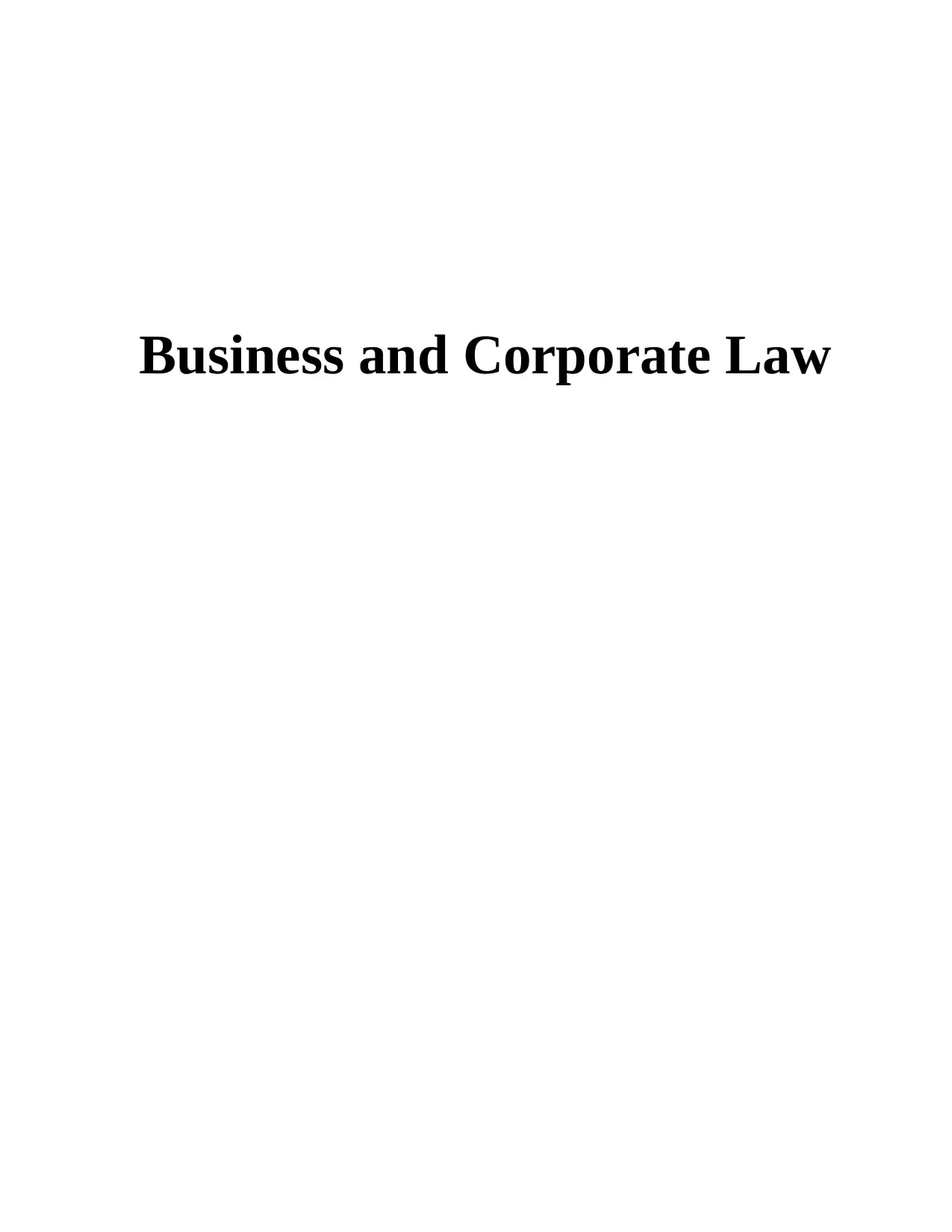
Business and Corporate Law
Paraphrase This Document
Need a fresh take? Get an instant paraphrase of this document with our AI Paraphraser
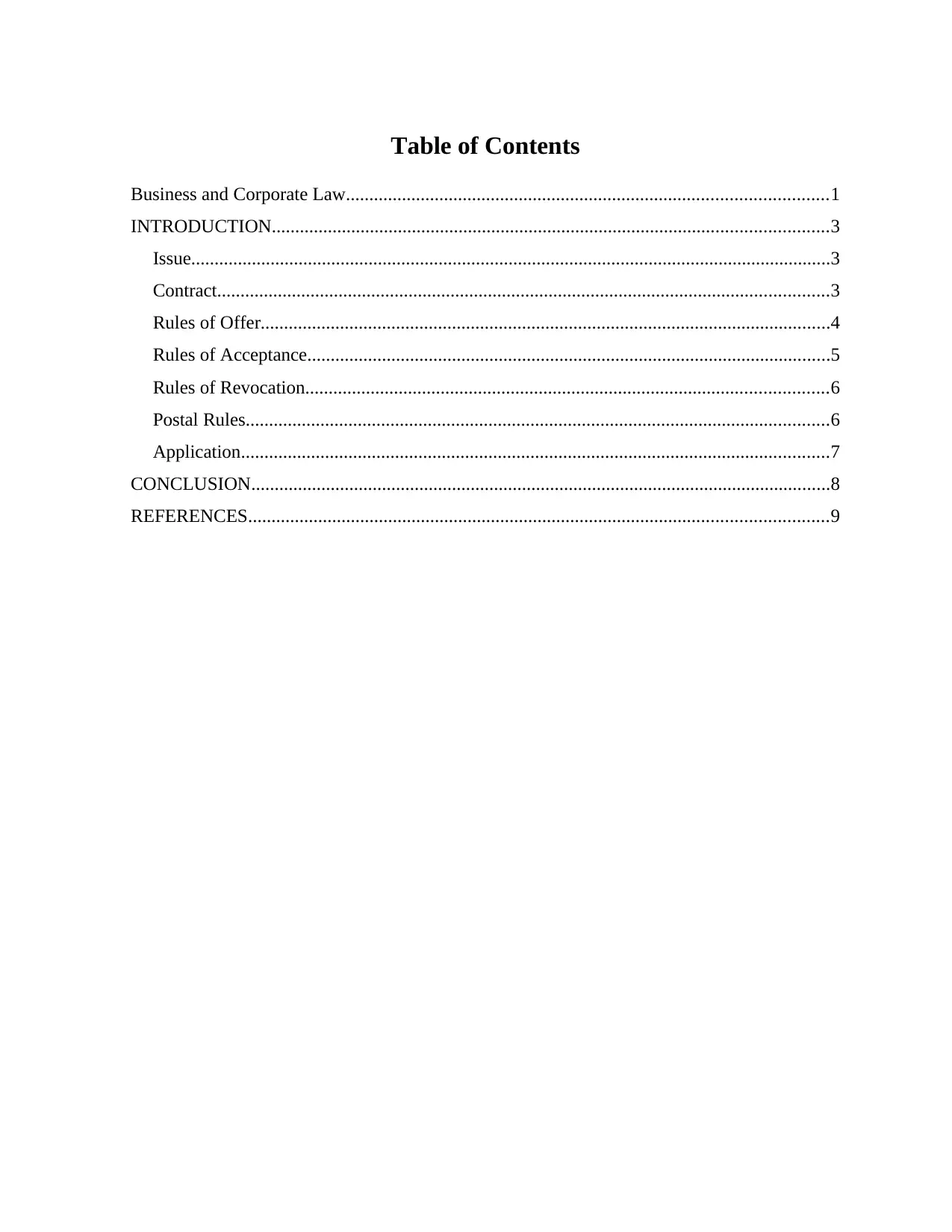
Table of Contents
Business and Corporate Law.......................................................................................................1
INTRODUCTION.......................................................................................................................3
Issue.........................................................................................................................................3
Contract...................................................................................................................................3
Rules of Offer..........................................................................................................................4
Rules of Acceptance................................................................................................................5
Rules of Revocation................................................................................................................6
Postal Rules.............................................................................................................................6
Application..............................................................................................................................7
CONCLUSION............................................................................................................................8
REFERENCES............................................................................................................................9
Business and Corporate Law.......................................................................................................1
INTRODUCTION.......................................................................................................................3
Issue.........................................................................................................................................3
Contract...................................................................................................................................3
Rules of Offer..........................................................................................................................4
Rules of Acceptance................................................................................................................5
Rules of Revocation................................................................................................................6
Postal Rules.............................................................................................................................6
Application..............................................................................................................................7
CONCLUSION............................................................................................................................8
REFERENCES............................................................................................................................9
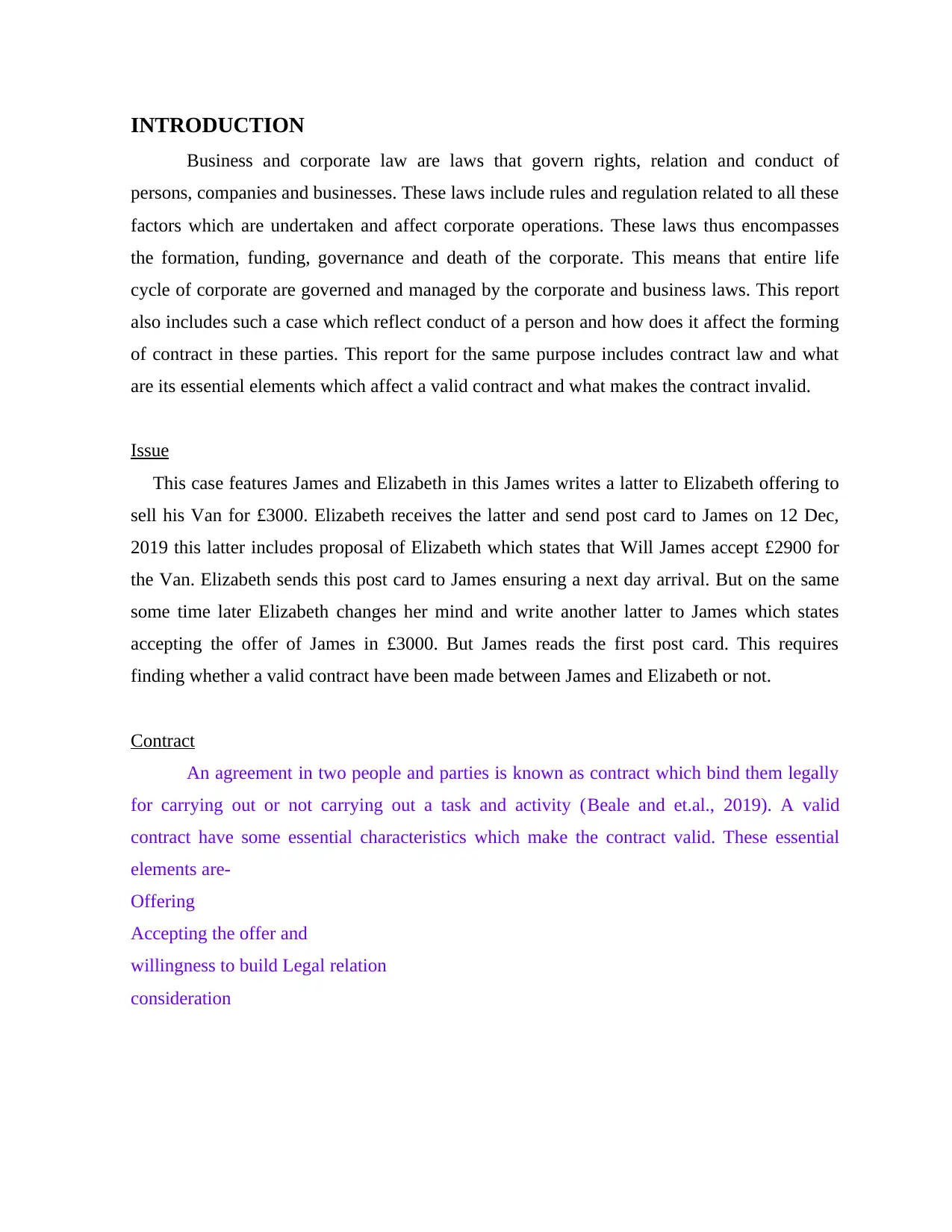
INTRODUCTION
Business and corporate law are laws that govern rights, relation and conduct of
persons, companies and businesses. These laws include rules and regulation related to all these
factors which are undertaken and affect corporate operations. These laws thus encompasses
the formation, funding, governance and death of the corporate. This means that entire life
cycle of corporate are governed and managed by the corporate and business laws. This report
also includes such a case which reflect conduct of a person and how does it affect the forming
of contract in these parties. This report for the same purpose includes contract law and what
are its essential elements which affect a valid contract and what makes the contract invalid.
Issue
This case features James and Elizabeth in this James writes a latter to Elizabeth offering to
sell his Van for £3000. Elizabeth receives the latter and send post card to James on 12 Dec,
2019 this latter includes proposal of Elizabeth which states that Will James accept £2900 for
the Van. Elizabeth sends this post card to James ensuring a next day arrival. But on the same
some time later Elizabeth changes her mind and write another latter to James which states
accepting the offer of James in £3000. But James reads the first post card. This requires
finding whether a valid contract have been made between James and Elizabeth or not.
Contract
An agreement in two people and parties is known as contract which bind them legally
for carrying out or not carrying out a task and activity (Beale and et.al., 2019). A valid
contract have some essential characteristics which make the contract valid. These essential
elements are-
Offering
Accepting the offer and
willingness to build Legal relation
consideration
Business and corporate law are laws that govern rights, relation and conduct of
persons, companies and businesses. These laws include rules and regulation related to all these
factors which are undertaken and affect corporate operations. These laws thus encompasses
the formation, funding, governance and death of the corporate. This means that entire life
cycle of corporate are governed and managed by the corporate and business laws. This report
also includes such a case which reflect conduct of a person and how does it affect the forming
of contract in these parties. This report for the same purpose includes contract law and what
are its essential elements which affect a valid contract and what makes the contract invalid.
Issue
This case features James and Elizabeth in this James writes a latter to Elizabeth offering to
sell his Van for £3000. Elizabeth receives the latter and send post card to James on 12 Dec,
2019 this latter includes proposal of Elizabeth which states that Will James accept £2900 for
the Van. Elizabeth sends this post card to James ensuring a next day arrival. But on the same
some time later Elizabeth changes her mind and write another latter to James which states
accepting the offer of James in £3000. But James reads the first post card. This requires
finding whether a valid contract have been made between James and Elizabeth or not.
Contract
An agreement in two people and parties is known as contract which bind them legally
for carrying out or not carrying out a task and activity (Beale and et.al., 2019). A valid
contract have some essential characteristics which make the contract valid. These essential
elements are-
Offering
Accepting the offer and
willingness to build Legal relation
consideration
⊘ This is a preview!⊘
Do you want full access?
Subscribe today to unlock all pages.

Trusted by 1+ million students worldwide
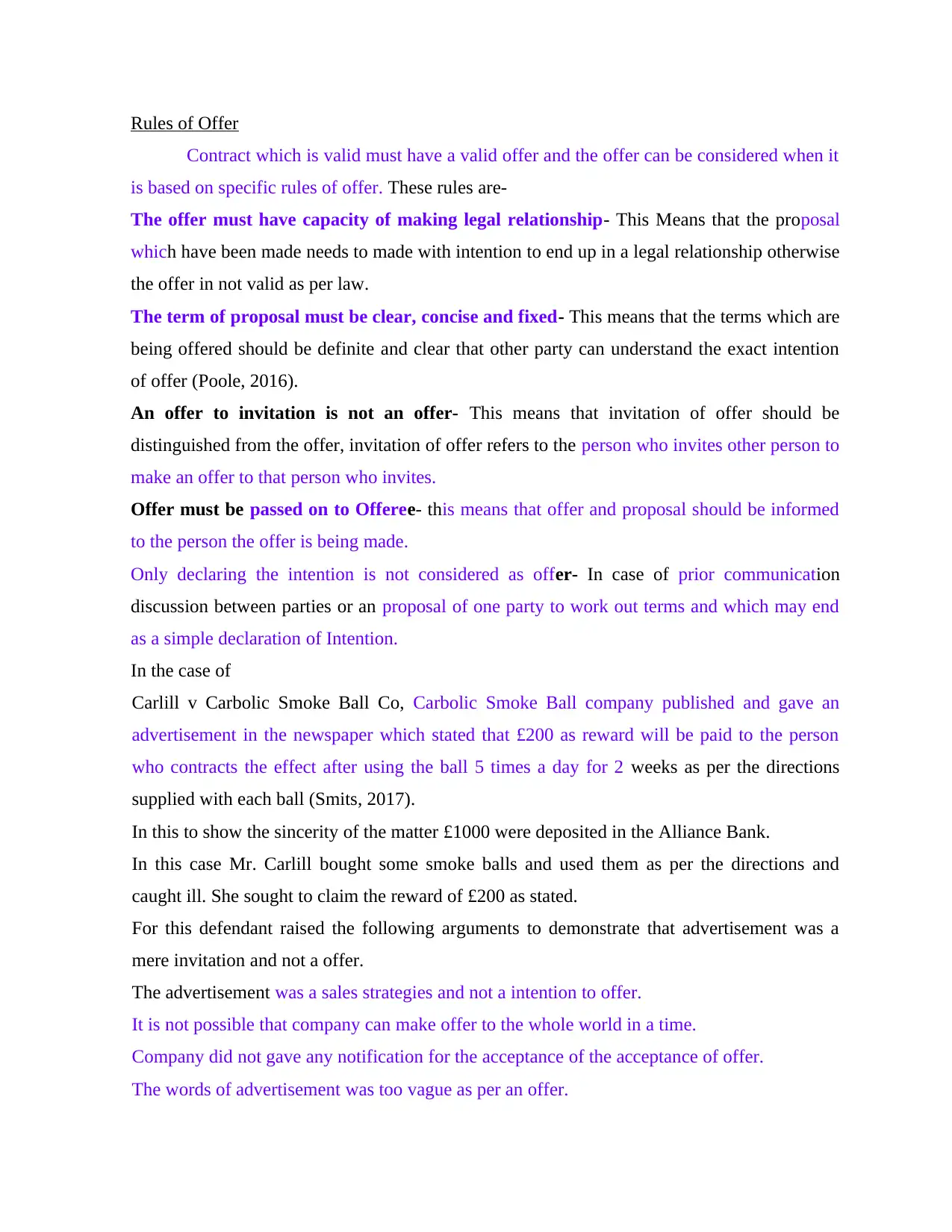
Rules of Offer
Contract which is valid must have a valid offer and the offer can be considered when it
is based on specific rules of offer. These rules are-
The offer must have capacity of making legal relationship- This Means that the proposal
which have been made needs to made with intention to end up in a legal relationship otherwise
the offer in not valid as per law.
The term of proposal must be clear, concise and fixed- This means that the terms which are
being offered should be definite and clear that other party can understand the exact intention
of offer (Poole, 2016).
An offer to invitation is not an offer- This means that invitation of offer should be
distinguished from the offer, invitation of offer refers to the person who invites other person to
make an offer to that person who invites.
Offer must be passed on to Offeree- this means that offer and proposal should be informed
to the person the offer is being made.
Only declaring the intention is not considered as offer- In case of prior communication
discussion between parties or an proposal of one party to work out terms and which may end
as a simple declaration of Intention.
In the case of
Carlill v Carbolic Smoke Ball Co, Carbolic Smoke Ball company published and gave an
advertisement in the newspaper which stated that £200 as reward will be paid to the person
who contracts the effect after using the ball 5 times a day for 2 weeks as per the directions
supplied with each ball (Smits, 2017).
In this to show the sincerity of the matter £1000 were deposited in the Alliance Bank.
In this case Mr. Carlill bought some smoke balls and used them as per the directions and
caught ill. She sought to claim the reward of £200 as stated.
For this defendant raised the following arguments to demonstrate that advertisement was a
mere invitation and not a offer.
The advertisement was a sales strategies and not a intention to offer.
It is not possible that company can make offer to the whole world in a time.
Company did not gave any notification for the acceptance of the acceptance of offer.
The words of advertisement was too vague as per an offer.
Contract which is valid must have a valid offer and the offer can be considered when it
is based on specific rules of offer. These rules are-
The offer must have capacity of making legal relationship- This Means that the proposal
which have been made needs to made with intention to end up in a legal relationship otherwise
the offer in not valid as per law.
The term of proposal must be clear, concise and fixed- This means that the terms which are
being offered should be definite and clear that other party can understand the exact intention
of offer (Poole, 2016).
An offer to invitation is not an offer- This means that invitation of offer should be
distinguished from the offer, invitation of offer refers to the person who invites other person to
make an offer to that person who invites.
Offer must be passed on to Offeree- this means that offer and proposal should be informed
to the person the offer is being made.
Only declaring the intention is not considered as offer- In case of prior communication
discussion between parties or an proposal of one party to work out terms and which may end
as a simple declaration of Intention.
In the case of
Carlill v Carbolic Smoke Ball Co, Carbolic Smoke Ball company published and gave an
advertisement in the newspaper which stated that £200 as reward will be paid to the person
who contracts the effect after using the ball 5 times a day for 2 weeks as per the directions
supplied with each ball (Smits, 2017).
In this to show the sincerity of the matter £1000 were deposited in the Alliance Bank.
In this case Mr. Carlill bought some smoke balls and used them as per the directions and
caught ill. She sought to claim the reward of £200 as stated.
For this defendant raised the following arguments to demonstrate that advertisement was a
mere invitation and not a offer.
The advertisement was a sales strategies and not a intention to offer.
It is not possible that company can make offer to the whole world in a time.
Company did not gave any notification for the acceptance of the acceptance of offer.
The words of advertisement was too vague as per an offer.
Paraphrase This Document
Need a fresh take? Get an instant paraphrase of this document with our AI Paraphraser
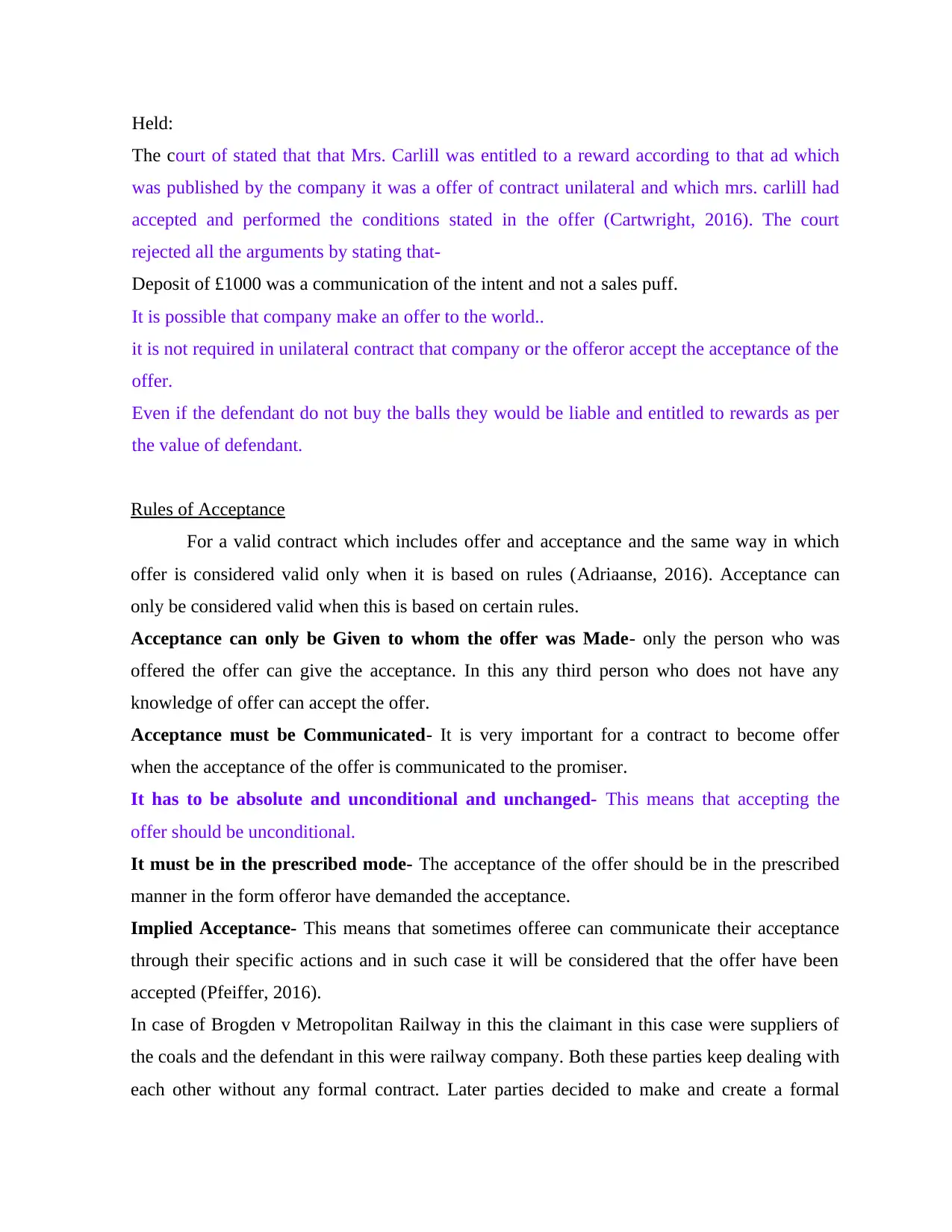
Held:
The court of stated that that Mrs. Carlill was entitled to a reward according to that ad which
was published by the company it was a offer of contract unilateral and which mrs. carlill had
accepted and performed the conditions stated in the offer (Cartwright, 2016). The court
rejected all the arguments by stating that-
Deposit of £1000 was a communication of the intent and not a sales puff.
It is possible that company make an offer to the world..
it is not required in unilateral contract that company or the offeror accept the acceptance of the
offer.
Even if the defendant do not buy the balls they would be liable and entitled to rewards as per
the value of defendant.
Rules of Acceptance
For a valid contract which includes offer and acceptance and the same way in which
offer is considered valid only when it is based on rules (Adriaanse, 2016). Acceptance can
only be considered valid when this is based on certain rules.
Acceptance can only be Given to whom the offer was Made- only the person who was
offered the offer can give the acceptance. In this any third person who does not have any
knowledge of offer can accept the offer.
Acceptance must be Communicated- It is very important for a contract to become offer
when the acceptance of the offer is communicated to the promiser.
It has to be absolute and unconditional and unchanged- This means that accepting the
offer should be unconditional.
It must be in the prescribed mode- The acceptance of the offer should be in the prescribed
manner in the form offeror have demanded the acceptance.
Implied Acceptance- This means that sometimes offeree can communicate their acceptance
through their specific actions and in such case it will be considered that the offer have been
accepted (Pfeiffer, 2016).
In case of Brogden v Metropolitan Railway in this the claimant in this case were suppliers of
the coals and the defendant in this were railway company. Both these parties keep dealing with
each other without any formal contract. Later parties decided to make and create a formal
The court of stated that that Mrs. Carlill was entitled to a reward according to that ad which
was published by the company it was a offer of contract unilateral and which mrs. carlill had
accepted and performed the conditions stated in the offer (Cartwright, 2016). The court
rejected all the arguments by stating that-
Deposit of £1000 was a communication of the intent and not a sales puff.
It is possible that company make an offer to the world..
it is not required in unilateral contract that company or the offeror accept the acceptance of the
offer.
Even if the defendant do not buy the balls they would be liable and entitled to rewards as per
the value of defendant.
Rules of Acceptance
For a valid contract which includes offer and acceptance and the same way in which
offer is considered valid only when it is based on rules (Adriaanse, 2016). Acceptance can
only be considered valid when this is based on certain rules.
Acceptance can only be Given to whom the offer was Made- only the person who was
offered the offer can give the acceptance. In this any third person who does not have any
knowledge of offer can accept the offer.
Acceptance must be Communicated- It is very important for a contract to become offer
when the acceptance of the offer is communicated to the promiser.
It has to be absolute and unconditional and unchanged- This means that accepting the
offer should be unconditional.
It must be in the prescribed mode- The acceptance of the offer should be in the prescribed
manner in the form offeror have demanded the acceptance.
Implied Acceptance- This means that sometimes offeree can communicate their acceptance
through their specific actions and in such case it will be considered that the offer have been
accepted (Pfeiffer, 2016).
In case of Brogden v Metropolitan Railway in this the claimant in this case were suppliers of
the coals and the defendant in this were railway company. Both these parties keep dealing with
each other without any formal contract. Later parties decided to make and create a formal
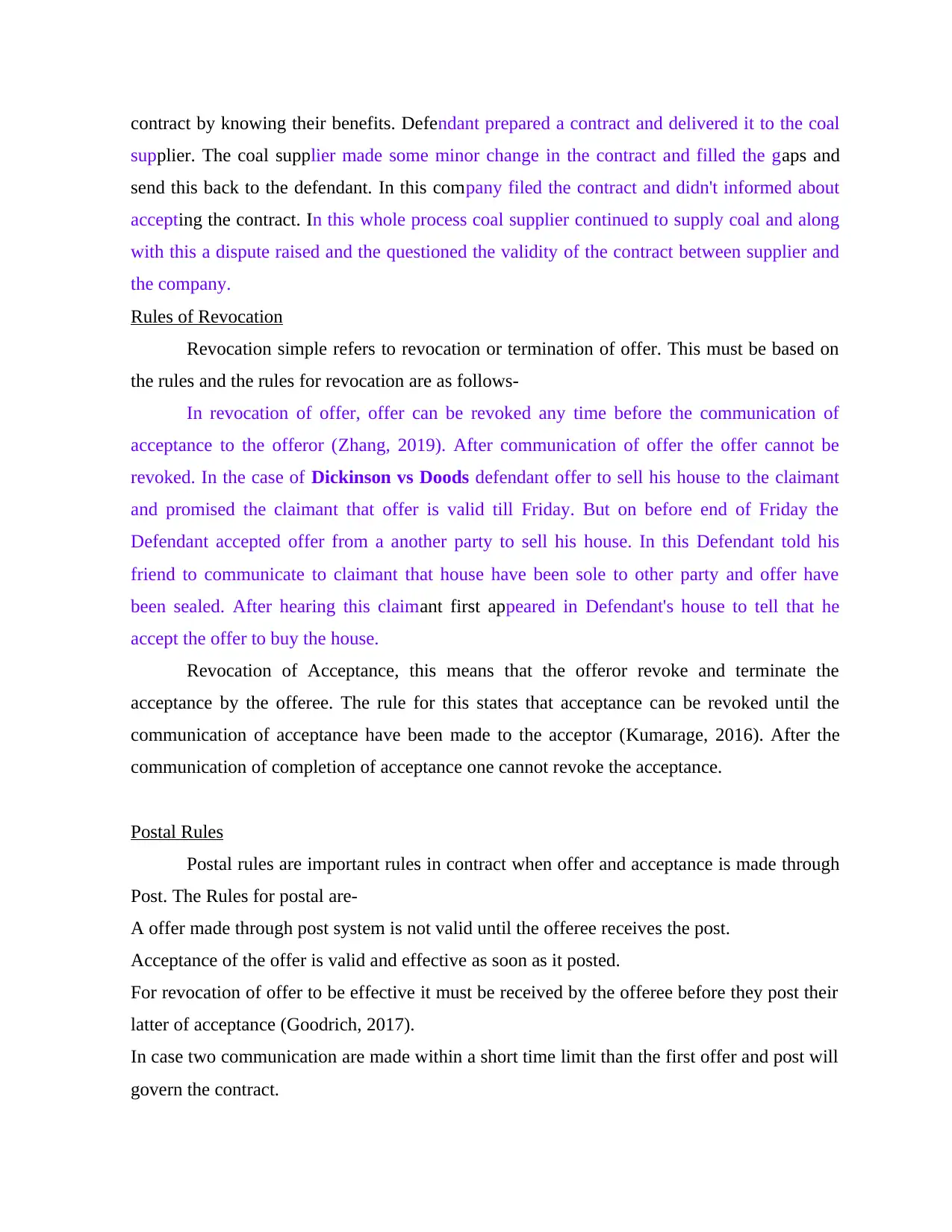
contract by knowing their benefits. Defendant prepared a contract and delivered it to the coal
supplier. The coal supplier made some minor change in the contract and filled the gaps and
send this back to the defendant. In this company filed the contract and didn't informed about
accepting the contract. In this whole process coal supplier continued to supply coal and along
with this a dispute raised and the questioned the validity of the contract between supplier and
the company.
Rules of Revocation
Revocation simple refers to revocation or termination of offer. This must be based on
the rules and the rules for revocation are as follows-
In revocation of offer, offer can be revoked any time before the communication of
acceptance to the offeror (Zhang, 2019). After communication of offer the offer cannot be
revoked. In the case of Dickinson vs Doods defendant offer to sell his house to the claimant
and promised the claimant that offer is valid till Friday. But on before end of Friday the
Defendant accepted offer from a another party to sell his house. In this Defendant told his
friend to communicate to claimant that house have been sole to other party and offer have
been sealed. After hearing this claimant first appeared in Defendant's house to tell that he
accept the offer to buy the house.
Revocation of Acceptance, this means that the offeror revoke and terminate the
acceptance by the offeree. The rule for this states that acceptance can be revoked until the
communication of acceptance have been made to the acceptor (Kumarage, 2016). After the
communication of completion of acceptance one cannot revoke the acceptance.
Postal Rules
Postal rules are important rules in contract when offer and acceptance is made through
Post. The Rules for postal are-
A offer made through post system is not valid until the offeree receives the post.
Acceptance of the offer is valid and effective as soon as it posted.
For revocation of offer to be effective it must be received by the offeree before they post their
latter of acceptance (Goodrich, 2017).
In case two communication are made within a short time limit than the first offer and post will
govern the contract.
supplier. The coal supplier made some minor change in the contract and filled the gaps and
send this back to the defendant. In this company filed the contract and didn't informed about
accepting the contract. In this whole process coal supplier continued to supply coal and along
with this a dispute raised and the questioned the validity of the contract between supplier and
the company.
Rules of Revocation
Revocation simple refers to revocation or termination of offer. This must be based on
the rules and the rules for revocation are as follows-
In revocation of offer, offer can be revoked any time before the communication of
acceptance to the offeror (Zhang, 2019). After communication of offer the offer cannot be
revoked. In the case of Dickinson vs Doods defendant offer to sell his house to the claimant
and promised the claimant that offer is valid till Friday. But on before end of Friday the
Defendant accepted offer from a another party to sell his house. In this Defendant told his
friend to communicate to claimant that house have been sole to other party and offer have
been sealed. After hearing this claimant first appeared in Defendant's house to tell that he
accept the offer to buy the house.
Revocation of Acceptance, this means that the offeror revoke and terminate the
acceptance by the offeree. The rule for this states that acceptance can be revoked until the
communication of acceptance have been made to the acceptor (Kumarage, 2016). After the
communication of completion of acceptance one cannot revoke the acceptance.
Postal Rules
Postal rules are important rules in contract when offer and acceptance is made through
Post. The Rules for postal are-
A offer made through post system is not valid until the offeree receives the post.
Acceptance of the offer is valid and effective as soon as it posted.
For revocation of offer to be effective it must be received by the offeree before they post their
latter of acceptance (Goodrich, 2017).
In case two communication are made within a short time limit than the first offer and post will
govern the contract.
⊘ This is a preview!⊘
Do you want full access?
Subscribe today to unlock all pages.

Trusted by 1+ million students worldwide
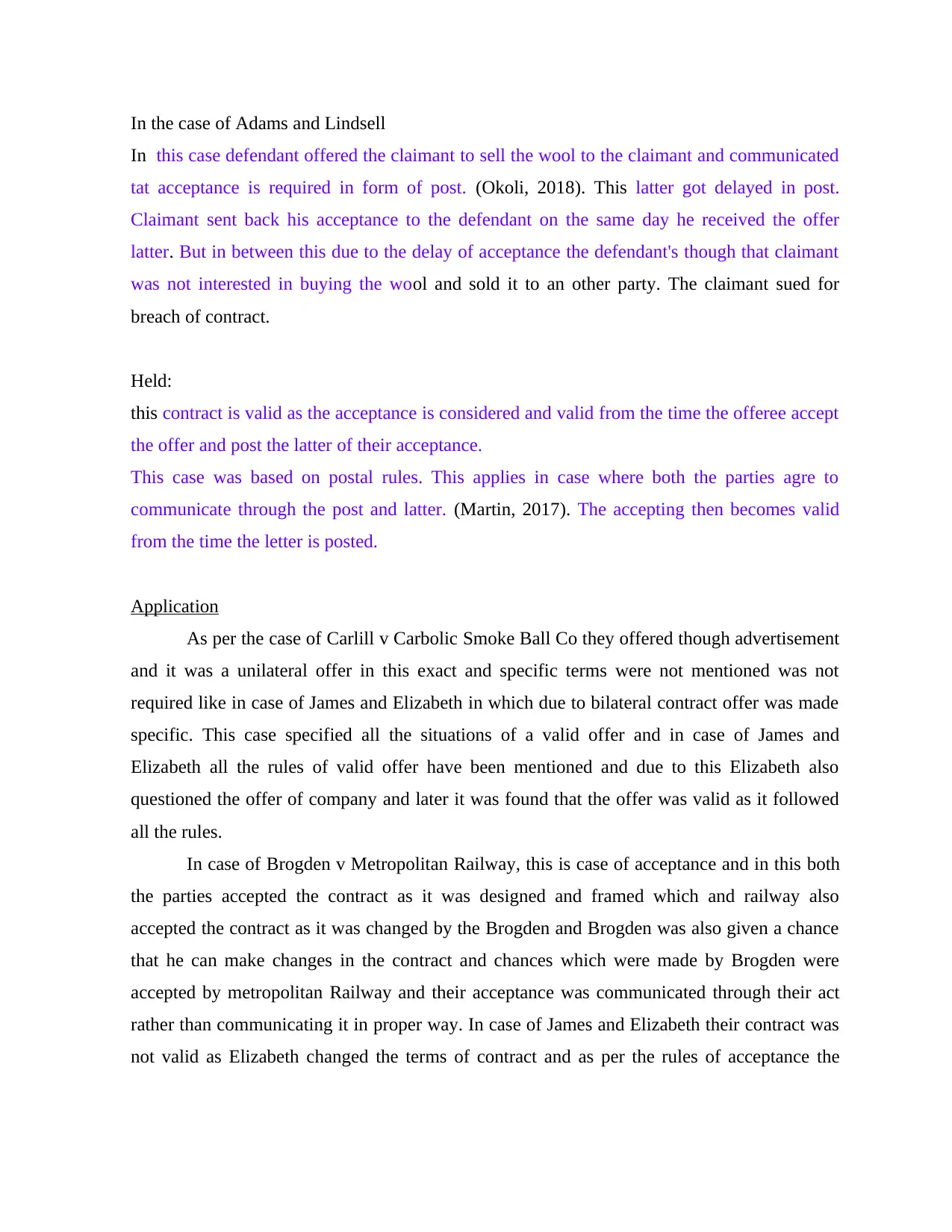
In the case of Adams and Lindsell
In this case defendant offered the claimant to sell the wool to the claimant and communicated
tat acceptance is required in form of post. (Okoli, 2018). This latter got delayed in post.
Claimant sent back his acceptance to the defendant on the same day he received the offer
latter. But in between this due to the delay of acceptance the defendant's though that claimant
was not interested in buying the wool and sold it to an other party. The claimant sued for
breach of contract.
Held:
this contract is valid as the acceptance is considered and valid from the time the offeree accept
the offer and post the latter of their acceptance.
This case was based on postal rules. This applies in case where both the parties agre to
communicate through the post and latter. (Martin, 2017). The accepting then becomes valid
from the time the letter is posted.
Application
As per the case of Carlill v Carbolic Smoke Ball Co they offered though advertisement
and it was a unilateral offer in this exact and specific terms were not mentioned was not
required like in case of James and Elizabeth in which due to bilateral contract offer was made
specific. This case specified all the situations of a valid offer and in case of James and
Elizabeth all the rules of valid offer have been mentioned and due to this Elizabeth also
questioned the offer of company and later it was found that the offer was valid as it followed
all the rules.
In case of Brogden v Metropolitan Railway, this is case of acceptance and in this both
the parties accepted the contract as it was designed and framed which and railway also
accepted the contract as it was changed by the Brogden and Brogden was also given a chance
that he can make changes in the contract and chances which were made by Brogden were
accepted by metropolitan Railway and their acceptance was communicated through their act
rather than communicating it in proper way. In case of James and Elizabeth their contract was
not valid as Elizabeth changed the terms of contract and as per the rules of acceptance the
In this case defendant offered the claimant to sell the wool to the claimant and communicated
tat acceptance is required in form of post. (Okoli, 2018). This latter got delayed in post.
Claimant sent back his acceptance to the defendant on the same day he received the offer
latter. But in between this due to the delay of acceptance the defendant's though that claimant
was not interested in buying the wool and sold it to an other party. The claimant sued for
breach of contract.
Held:
this contract is valid as the acceptance is considered and valid from the time the offeree accept
the offer and post the latter of their acceptance.
This case was based on postal rules. This applies in case where both the parties agre to
communicate through the post and latter. (Martin, 2017). The accepting then becomes valid
from the time the letter is posted.
Application
As per the case of Carlill v Carbolic Smoke Ball Co they offered though advertisement
and it was a unilateral offer in this exact and specific terms were not mentioned was not
required like in case of James and Elizabeth in which due to bilateral contract offer was made
specific. This case specified all the situations of a valid offer and in case of James and
Elizabeth all the rules of valid offer have been mentioned and due to this Elizabeth also
questioned the offer of company and later it was found that the offer was valid as it followed
all the rules.
In case of Brogden v Metropolitan Railway, this is case of acceptance and in this both
the parties accepted the contract as it was designed and framed which and railway also
accepted the contract as it was changed by the Brogden and Brogden was also given a chance
that he can make changes in the contract and chances which were made by Brogden were
accepted by metropolitan Railway and their acceptance was communicated through their act
rather than communicating it in proper way. In case of James and Elizabeth their contract was
not valid as Elizabeth changed the terms of contract and as per the rules of acceptance the
Paraphrase This Document
Need a fresh take? Get an instant paraphrase of this document with our AI Paraphraser
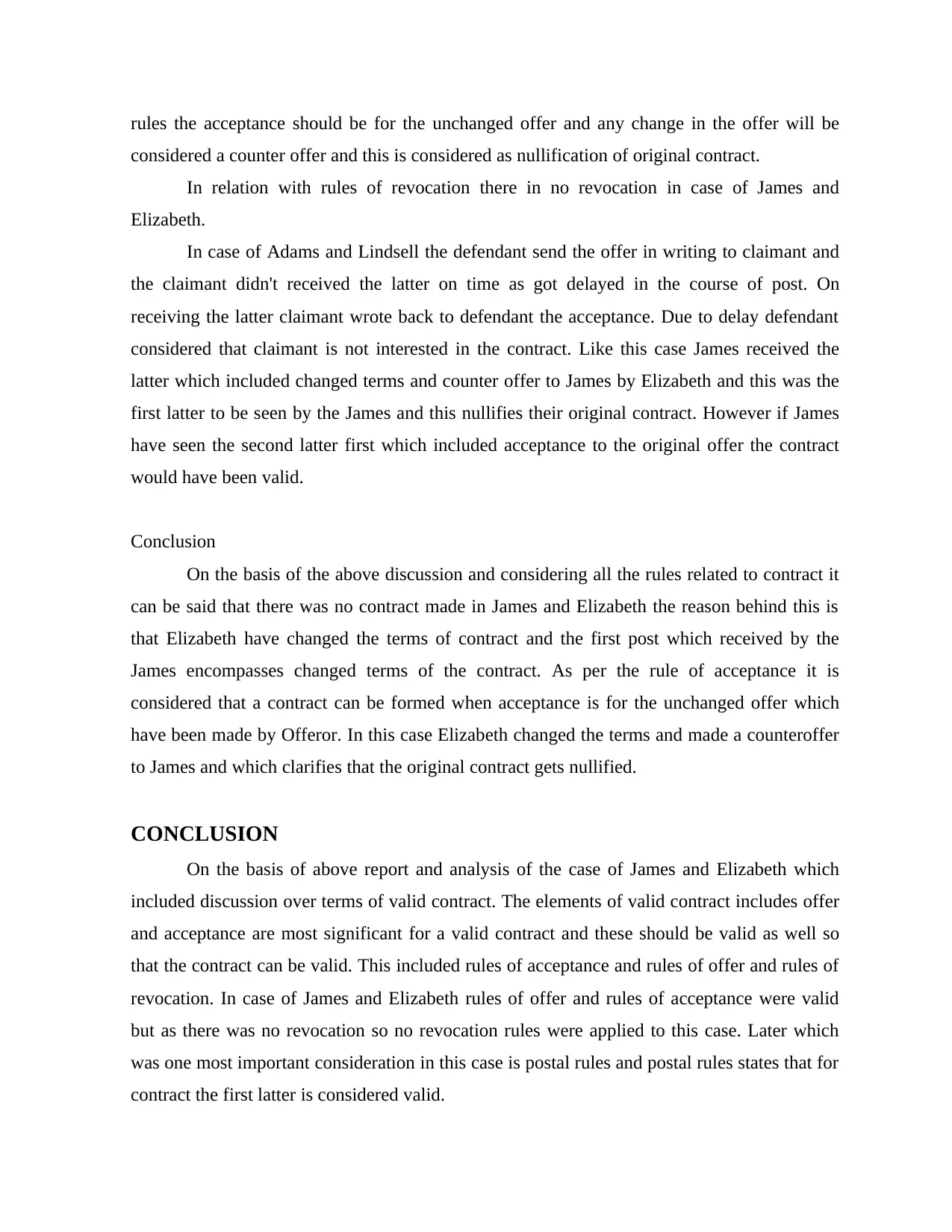
rules the acceptance should be for the unchanged offer and any change in the offer will be
considered a counter offer and this is considered as nullification of original contract.
In relation with rules of revocation there in no revocation in case of James and
Elizabeth.
In case of Adams and Lindsell the defendant send the offer in writing to claimant and
the claimant didn't received the latter on time as got delayed in the course of post. On
receiving the latter claimant wrote back to defendant the acceptance. Due to delay defendant
considered that claimant is not interested in the contract. Like this case James received the
latter which included changed terms and counter offer to James by Elizabeth and this was the
first latter to be seen by the James and this nullifies their original contract. However if James
have seen the second latter first which included acceptance to the original offer the contract
would have been valid.
Conclusion
On the basis of the above discussion and considering all the rules related to contract it
can be said that there was no contract made in James and Elizabeth the reason behind this is
that Elizabeth have changed the terms of contract and the first post which received by the
James encompasses changed terms of the contract. As per the rule of acceptance it is
considered that a contract can be formed when acceptance is for the unchanged offer which
have been made by Offeror. In this case Elizabeth changed the terms and made a counteroffer
to James and which clarifies that the original contract gets nullified.
CONCLUSION
On the basis of above report and analysis of the case of James and Elizabeth which
included discussion over terms of valid contract. The elements of valid contract includes offer
and acceptance are most significant for a valid contract and these should be valid as well so
that the contract can be valid. This included rules of acceptance and rules of offer and rules of
revocation. In case of James and Elizabeth rules of offer and rules of acceptance were valid
but as there was no revocation so no revocation rules were applied to this case. Later which
was one most important consideration in this case is postal rules and postal rules states that for
contract the first latter is considered valid.
considered a counter offer and this is considered as nullification of original contract.
In relation with rules of revocation there in no revocation in case of James and
Elizabeth.
In case of Adams and Lindsell the defendant send the offer in writing to claimant and
the claimant didn't received the latter on time as got delayed in the course of post. On
receiving the latter claimant wrote back to defendant the acceptance. Due to delay defendant
considered that claimant is not interested in the contract. Like this case James received the
latter which included changed terms and counter offer to James by Elizabeth and this was the
first latter to be seen by the James and this nullifies their original contract. However if James
have seen the second latter first which included acceptance to the original offer the contract
would have been valid.
Conclusion
On the basis of the above discussion and considering all the rules related to contract it
can be said that there was no contract made in James and Elizabeth the reason behind this is
that Elizabeth have changed the terms of contract and the first post which received by the
James encompasses changed terms of the contract. As per the rule of acceptance it is
considered that a contract can be formed when acceptance is for the unchanged offer which
have been made by Offeror. In this case Elizabeth changed the terms and made a counteroffer
to James and which clarifies that the original contract gets nullified.
CONCLUSION
On the basis of above report and analysis of the case of James and Elizabeth which
included discussion over terms of valid contract. The elements of valid contract includes offer
and acceptance are most significant for a valid contract and these should be valid as well so
that the contract can be valid. This included rules of acceptance and rules of offer and rules of
revocation. In case of James and Elizabeth rules of offer and rules of acceptance were valid
but as there was no revocation so no revocation rules were applied to this case. Later which
was one most important consideration in this case is postal rules and postal rules states that for
contract the first latter is considered valid.
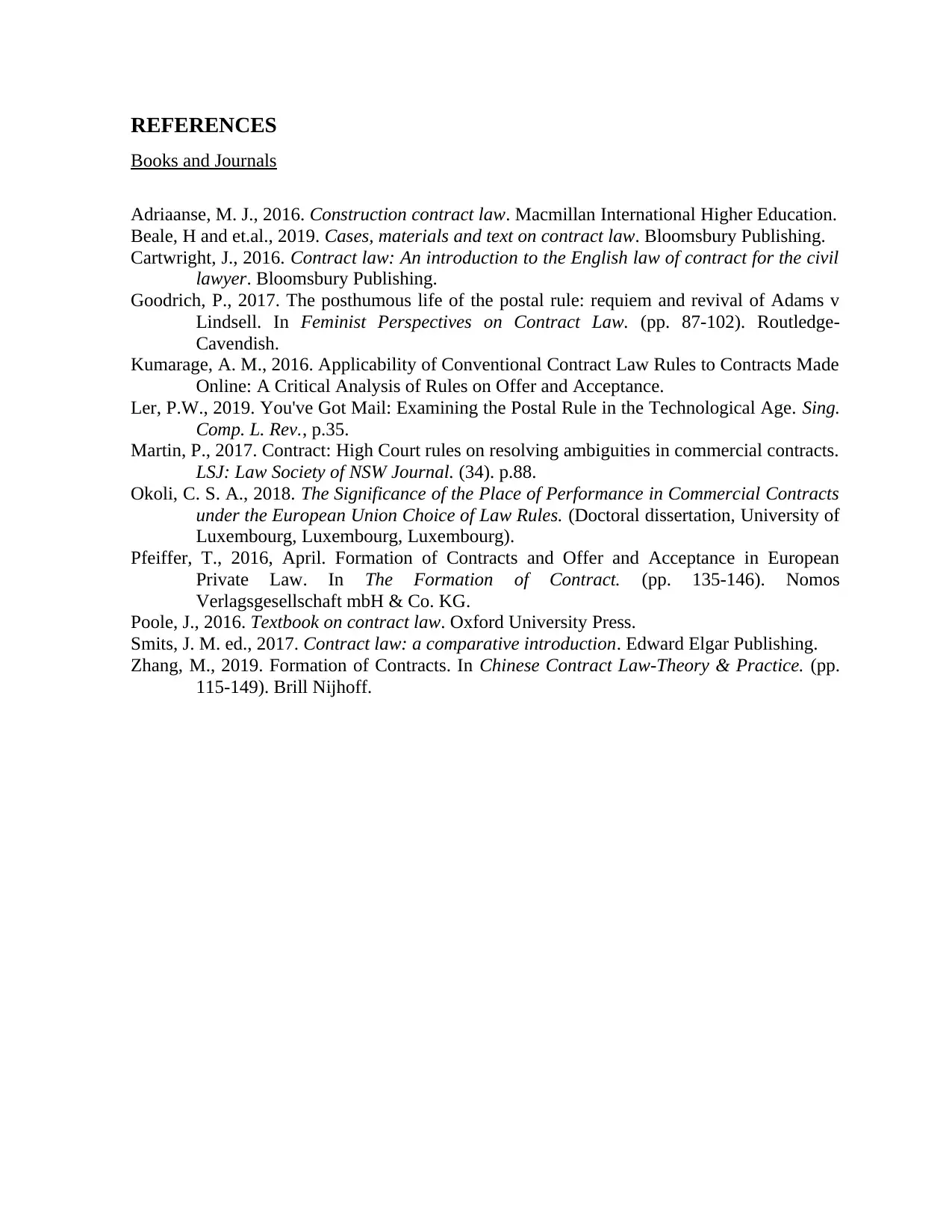
REFERENCES
Books and Journals
Adriaanse, M. J., 2016. Construction contract law. Macmillan International Higher Education.
Beale, H and et.al., 2019. Cases, materials and text on contract law. Bloomsbury Publishing.
Cartwright, J., 2016. Contract law: An introduction to the English law of contract for the civil
lawyer. Bloomsbury Publishing.
Goodrich, P., 2017. The posthumous life of the postal rule: requiem and revival of Adams v
Lindsell. In Feminist Perspectives on Contract Law. (pp. 87-102). Routledge-
Cavendish.
Kumarage, A. M., 2016. Applicability of Conventional Contract Law Rules to Contracts Made
Online: A Critical Analysis of Rules on Offer and Acceptance.
Ler, P.W., 2019. You've Got Mail: Examining the Postal Rule in the Technological Age. Sing.
Comp. L. Rev., p.35.
Martin, P., 2017. Contract: High Court rules on resolving ambiguities in commercial contracts.
LSJ: Law Society of NSW Journal. (34). p.88.
Okoli, C. S. A., 2018. The Significance of the Place of Performance in Commercial Contracts
under the European Union Choice of Law Rules. (Doctoral dissertation, University of
Luxembourg, Luxembourg, Luxembourg).
Pfeiffer, T., 2016, April. Formation of Contracts and Offer and Acceptance in European
Private Law. In The Formation of Contract. (pp. 135-146). Nomos
Verlagsgesellschaft mbH & Co. KG.
Poole, J., 2016. Textbook on contract law. Oxford University Press.
Smits, J. M. ed., 2017. Contract law: a comparative introduction. Edward Elgar Publishing.
Zhang, M., 2019. Formation of Contracts. In Chinese Contract Law-Theory & Practice. (pp.
115-149). Brill Nijhoff.
Books and Journals
Adriaanse, M. J., 2016. Construction contract law. Macmillan International Higher Education.
Beale, H and et.al., 2019. Cases, materials and text on contract law. Bloomsbury Publishing.
Cartwright, J., 2016. Contract law: An introduction to the English law of contract for the civil
lawyer. Bloomsbury Publishing.
Goodrich, P., 2017. The posthumous life of the postal rule: requiem and revival of Adams v
Lindsell. In Feminist Perspectives on Contract Law. (pp. 87-102). Routledge-
Cavendish.
Kumarage, A. M., 2016. Applicability of Conventional Contract Law Rules to Contracts Made
Online: A Critical Analysis of Rules on Offer and Acceptance.
Ler, P.W., 2019. You've Got Mail: Examining the Postal Rule in the Technological Age. Sing.
Comp. L. Rev., p.35.
Martin, P., 2017. Contract: High Court rules on resolving ambiguities in commercial contracts.
LSJ: Law Society of NSW Journal. (34). p.88.
Okoli, C. S. A., 2018. The Significance of the Place of Performance in Commercial Contracts
under the European Union Choice of Law Rules. (Doctoral dissertation, University of
Luxembourg, Luxembourg, Luxembourg).
Pfeiffer, T., 2016, April. Formation of Contracts and Offer and Acceptance in European
Private Law. In The Formation of Contract. (pp. 135-146). Nomos
Verlagsgesellschaft mbH & Co. KG.
Poole, J., 2016. Textbook on contract law. Oxford University Press.
Smits, J. M. ed., 2017. Contract law: a comparative introduction. Edward Elgar Publishing.
Zhang, M., 2019. Formation of Contracts. In Chinese Contract Law-Theory & Practice. (pp.
115-149). Brill Nijhoff.
⊘ This is a preview!⊘
Do you want full access?
Subscribe today to unlock all pages.

Trusted by 1+ million students worldwide
1 out of 9
Related Documents
Your All-in-One AI-Powered Toolkit for Academic Success.
+13062052269
info@desklib.com
Available 24*7 on WhatsApp / Email
![[object Object]](/_next/static/media/star-bottom.7253800d.svg)
Unlock your academic potential
Copyright © 2020–2026 A2Z Services. All Rights Reserved. Developed and managed by ZUCOL.





